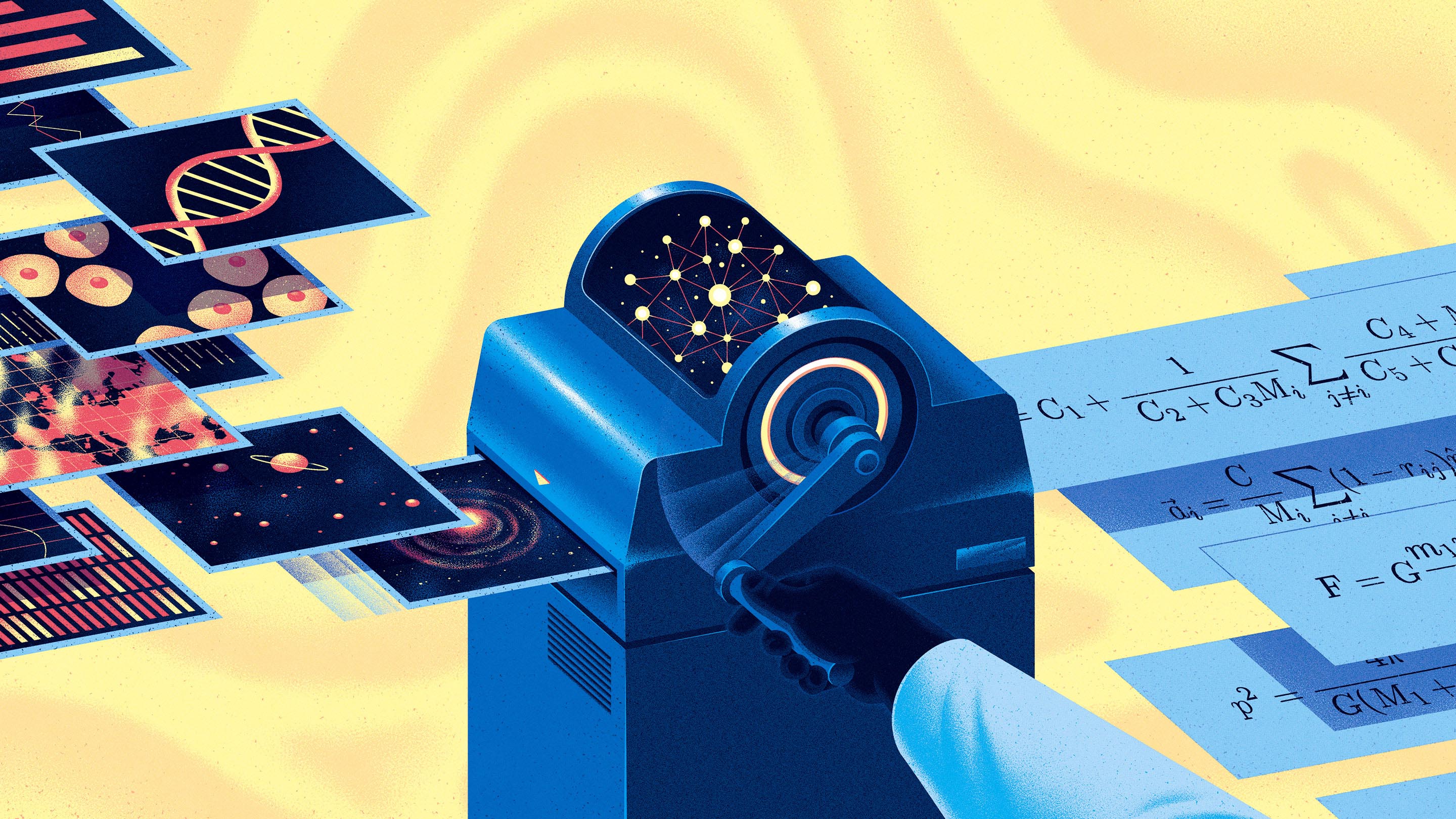 Source: Kouzou Sakai for Quanta Magazine
Source: Kouzou Sakai for Quanta Magazine
Prospective Students
Group Research Interests
The group works very broadly on machine learning and applications of machine learning in the physical sciences and astronomy. To help get a sense of our general research interests, this talk is recommended.
Speaking as Miles, one of my driving motivations is to automate research in the physical sciences, and myself and my group are interested in working on a wide range of problems that can help us get there.
Research Opportunities
Interested in joining our group?
Let us know about your background and research interests.
Register Your InterestThere are many opportunities for students in this area of research at the University of Cambridge, which we outline below.
(Do keep in mind that admission to these programs is highly competitive.)
Masters
If you are an undergraduate student, I would recommend applying to the new and first-of-its-kind MPhil in Data Intensive Science, which I view as the perfect course for seeding the next generation of AI-for-science researchers. I have the pleasure of teaching the deep learning module for this course, as well as mentoring students and their projects.
You may also consider the MASt in Astronomy which is a more general astronomy degree (I help supervise some projects for).
Finally, there is the famed Part III Mathematics course for those eager to develop a very robust mathematical foundation.
PhD
I can supervise or co-supervise students in both DAMTP and the Institute of Astronomy (I am 50/50 between the two), and am open to co-supervising students who are admitted to PhD programs in other departments, such as Computer Science or Engineering.
If you are interested in joining my group, I have collected some information below that may be helpful.
PhD in Astronomy
This is good option for students with interests/experience in astronomy/astrophysics.
PhD in Applied Mathematics and Theoretical Physics (DAMTP)
This is a good option for students wanting to work with me outside of astronomy, such as entirely in pure ML, or ML applied to non-astro areas of the physical sciences.
Scholarships
At Cambridge, funding is automatically considered for many sources as part of the application. This includes departmental, STFC, and EPSRC studentships, Data-intensive Science PhD scholarships, Harding scholarships, college-based scholarships (what is a college?), and others.
Note that Gates scholarships require additional application materials and have an earlier deadline.
However, I strongly encourage you to also apply for external funding as this can increase your chance of acceptance.
Projects
I have applied and pure machine learning projects available in many areas, and am of course eager to supervise student-proposed ideas!
For a rough guide of the flavor of projects I might suggest, you can see the list below (written in 2024).
- Machine Learning
- Polymathic AI projects
- Mechanistic interpretability for scientific foundation models
- Coarsening within foundation models
- Multi-modal embeddings
- Model discovery within foundation models
- Transferring large language model concepts to science
- Mathematical formalisation
- Language models for astronomy
- Specific applications of foundation models
- Graph neural networks: coarsening, large models, and more
- Symbolic regression fundamental research
- PySR next generation
- Reinforcement learning in the loop
- Research in evolutionary algorithms
- Bayesian approaches and uncertainty estimates
- Tensor expressions (How do we discover GR from data?)
- Co-evolving neural networks with symbolic representations
- Gradient expressions and partial differential equations
- Shared sub-expressions
- Applied automatic discovery projects
- Evolving new concepts and empirical relations in astrophysics and fluid dynamics
- Evolving new operators in physics
- Evolving better algorithms for machine learning
- More approaches to incorporating physics into machine learning
- Lagrangian Neural Networks
- The intersection of the renormalization group and machine learning
- Conformal prediction projects
- Polymathic AI projects
- Specific science applications
- Simulation-based inference (across many domains)
- Planetary dynamics, and exoplanet atmosphere projects
- Cosmological inference projects
- Finding new observational probes of galaxy formation
- Discovering the equations of multiscale physics and turbulence
- Astrostatistics and survey science projects
- [Always happy to discuss student-proposed ideas!]
I am happy to co-supervise applied machine learning projects with faculty in the Institute of Astronomy and DAMTP in a variety of areas in the physical sciences, so you might consider specific research areas of other faculty which might be interesting to apply machine learning to.
I am also open to serving as a secondary supervisor for students already admitted to other departments such as Computer Science, Engineering, or Physics. If you are interested in this arrangement, please arrange it with your primary supervisor in your department after admission.